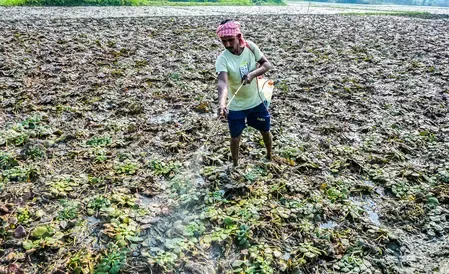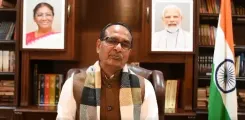Is South Korea's Lee Jae-myung Strengthening His Position in DP's Stronghold While Kim Moon-soo Targets Key Battlegrounds?

Synopsis
Key Takeaways
- Lee Jae-myung is solidifying his base in North Jeolla.
- Kim Moon-soo is targeting critical battlegrounds in Gyeonggi and South Chungcheong.
- The upcoming June 3 presidential election is pivotal for South Korea's political landscape.
- Public sentiment is crucial in the greater Seoul area.
- Data privacy initiatives are becoming a significant campaign issue.
Seoul, May 16 (NationPress) Lee Jae-myung, the candidate from South Korea's Democratic Party (DP), made a significant appeal to voters in North Jeolla Province on Friday. Meanwhile, Kim Moon-soo from the People Power Party (PPP) focused his efforts on key battleground regions within Gyeonggi and South Chungcheong provinces.
As the official campaigning for the June 3 presidential election progresses into its fifth day, Lee appears to be reinforcing his support within this DP stronghold, while Kim aims to attract centrist voters in these critical battleground areas.
This election will determine the successor to former South Korean President Yoon Suk Yeol, who was removed from office due to a failed attempt to impose martial law.
Currently, Lee maintains a strong lead in opinion polls amidst a three-way contest, which also features Lee Jun-seok from the minor New Reform Party.
A recent survey by Gallup Korea indicates that DP's Lee holds a 51% support rating, significantly ahead of Kim's 29%, while the minor party's Lee trails with only 8%.
Lee Jae-myung is scheduled to start his day with visits to Iksan and Gunsan in North Jeolla Province, followed by a meeting with young traditional musicians in Jeonju. He will conclude his day with a campaign rally at the back gate of Jeonbuk National University and wrap up in the southwestern city of Jeongeup.
On the other hand, PPP's Kim will focus his campaigning efforts in the greater Seoul area, often viewed as an indicator of public sentiment, striving to gain traction in this pivotal central region.
Starting his day by engaging with commuters at Pangyo in Seongnam, just south of Seoul, Kim will also hold a rally in a traditional market in Suwon. He plans to move to Dongtan, where he will announce his commitments regarding the Great Train Express (GTX) at the Dongtan Station.
His itinerary includes stops in Cheonan, Sejong, Cheongju, and Daejeon. In Sejong, he intends to visit the site designated for the future relocation of the National Assembly building and unveil his plans to enhance the administrative capital, as reported by Yonhap.
Meanwhile, Lee from the minor New Reform Party has proposed a vision to turn Busan into a global data hub by creating a data special zone. He also intends to introduce legislation requiring explicit consent from data subjects or approval from an independent committee for accessing high-risk sensitive information, even under a search warrant.









